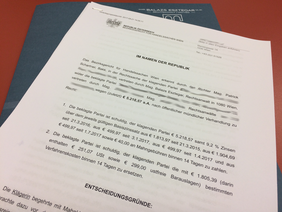The domain lease is a continuing obligation that can be terminated unilaterally by ordinary notice. According to the terms of the contract, the present contract could be terminated annually with a 90-day notice period, in each case at the end of the contract period.
The plaintiff subsequently invoiced the domain use for the years 2014 to 2016 and submitted its invoice to the defendant on 02.01.2017. The defendant expressed surprise at this and stated that he had not been using the domain since the end of 2014 and had terminated the domain with effect from 19th March 2015 on 6th October 2014. However, the plaintiff did not receive this email on 6th October 2014.
The court could not establish that the email with the termination of the domain lease agreement was actually received by the plaintiff at all. In its legal assessment, the court stated that although the termination as a unilateral declaration of intent requiring receipt terminates the contractual relationship in a legally formative manner, the contractual periods and deadlines in particular must be complied with. In the present case, the termination by email was equivalent to a written termination, especially since the parties had contractually agreed on this.
According to section 862a of the Civil Code (ABGB), declarations become effective upon receipt (theory of receipt). This is the case when they reach the sphere of influence of the recipient, i.e. disturbances which would prevent their being taken note of are only possible in his sphere, but not at the sender or the transmitting agency. For example, an ordinary letter is delivered when it is posted in the letterbox. A fax also travels at the risk of the sender.
According to the court, the same applies to e-mails:
An e-mail is retrievable by the recipient and thus delivered when it arrives and is stored in the recipient's mailbox and can be displayed on the screen or printed out (Rummel in Rummel/Lukas, ABGB § 862a RZ 4; 2 Ob 108/07g). Section 12 ECG also stipulates that electronic contractual declarations, other legally significant electronic declarations and electronic confirmations of receipt are only deemed to have been received if the party for whom they are intended can retrieve them under normal circumstances.
The burden of proof for the receipt of the declaration - in this case the notice of termination - follows the general rules, so that the proof of receipt has to be asserted and proven by the party who invokes it (RIS-Justiz RS0014065), in this case the defendant. Just like the sending of a letter, the sending of an e-mail does not establish a prima facie evidence of receipt. This applies even to registered letters or e-mails with confirmation of delivery or receipt. Even the submission of an e-mail transmission protocol does not establish prima facie evidence of the receipt of an e-mail (2 Ob 108/07g).
In the present case, the court did not consider it proven that the e-mail sent by the defendant was actually transmitted to the plaintiff. Since it would have been open to the defendant to request a confirmation of the termination or to use a technically more reliable communication channel for the termination, the court upheld the action and awarded the plaintiff, who was represented by lawyer Balazs Esztegar, the claimed domain rent in full.





